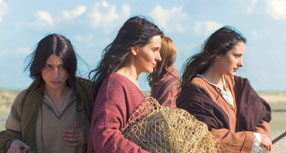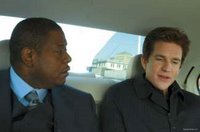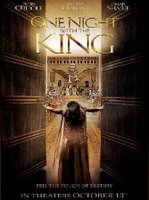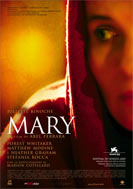
Few actors are famous in the way that Juliette Binoche could claim to be. Whilst the people on the street are largely ignorant of both her and her work (save perhaps
Chocolat), many of those in the art film crowd know that Binoche’s contribution to a film is reason enough for them to see it. It’s not surprising, then, that much of the publicity and discussion for Abel Ferrara’s
Mary has focussed on her, particularly as she is playing the title role. Hence there has been plenty of talk about Binoche’s role as Marie Palese, an actress who is inspired by her role playing Mary Magdalene in a Jesus movie and so heads to Jerusalem in search of spiritual enlightenment.
However, the star of this imaginary movie, is charismatic actor turned director, Tony Childress (Matthew Modine). It's clear that Childress has also funded and produced the movie himself, in exactly the manner he desired, regardless of the storm of criticism it has attracted. As such, he is clearly fashioned in Mel Gibson’s image. Childress’s film,
This is My Blood, may be as unconventional as Gibson’s film was ultra-traditional, but the parallels are clear. When Childress jokes that the reason he made the film was "because that Gibson movie made like a billion dollars" we sense director Abel Ferrara underlining the similarities whilst simultaneously poking fun at the inevitable rush to cash in on the success of
The Passion.
One of the interesting things about the film is that it's hard to tell what sort of film
This is My Blood actually is. Indeed, we see very little of it. The opening scene of
Mary appears to be lifted straight from Childress's movie, only for the next scene to suggest that this was actually Marie Palese's dream. Later on, a dreamlike shot of Palese gives way to what appears to be another scene from the movie. Since the vocals are introduced first, over the top of this footage of Palese, it initially suggests that this too is only in her mind. Yet this scene is immediately followed by one of a TV presenter informing his audience that they have just witnessed a clip from the actual movie.

Hence it is difficult to know exactly how much of the movie is shown. At best, only five scenes from the movie are included – and two of these may simply be in Marie Palese's, mind. Of the other three, two are taken solely from the non-canonical,
Gospel of Mary. Thus, the only scene from the film that definitely is taken from the Gospels is that of Jesus washing the disciples' feet. And the sound accompanying this clip is not even from Childress's fictional movie, but from an academic explaining how this act demonstrated Jesus's message of love.
So, the majority of the film remains a mystery. How much is from the canonical gospels? The Gospel of Mary is very short, certainly not long enough to be the basis of a feature film, how greater part does it play, and what does the rest consist of. Furthermore, what are the offensive elements in the film? It is criticised both by some Jewish groups on grounds of anti-Semitism, and some Christians because it departs from orthodoxy. Is it even meant to be a good film? The Jesus it portrays is horribly miscast, but is that Childress's fault or Ferrara's? Interestingly, Childress frequently repeats the message that his critics should see the movie before they offer criticism, yet, in stark contrast to, say,
Jesus of Montreal we are given only a fleeting glimpse of it to make up our own minds.
Childress's movie, however, is only a small part of the overall story. The main story, is about the spiritual journey of Ted Younger, played by Forest Whitaker. Younger chairs a national TV program discussing religious issues for a mainstream audience, grilling various experts from academics to religious leaders. He is deeply ambivalent about his faith, both publicly and privately, and the film implies that this is amongst the reason his show is such a success.

Ted knows neither of the other two main characters at the start of the film, but when he sees the movie at a press screening, he decides to try and interview them both for his programme. Childress is naturally keen to promote his movie, and agrees fairly readily. Palese, however, has been settled in Jerusalem for a year, and is reluctant to return to anything to do with acting. Younger is only able to get hold of her because he has been having an affair with Gretchen, one of Palese's friends.
This sparks a series of three phone calls between Ted and Marie. The first begins with Ted trying to get her to appear on his show. Marie is evasive, preferring to turn the conversation around to her recent spiritual insights. Initially, Ted is left unimpressed by Marie's statement that "Jesus helped Mary Magdalene, and s/he’s helping me now". Yet, strangely, when his personal life runs into problems, he finds himself calling her up to discuss them. Younger is clearly in need of redemption. "I’ve done so many bad things" he later confesses and whilst he’s no
Bad Lieutenant we see enough of his behaviour to be unable to deny his self-accusation.
Director Abel Ferrara manages to draw impressive and complex performances from all three actors. Binoche's final scenes are shot without sound, yet convey the process of her finding peace wonderfully. Modine swaggers about with a driven self-importance and yet somehow connects you to his suffering despite his arrogance, and self-centredness. Quite what Ferarra is trying to say by having this character play Jesus is unclear, but it's a fascinating question that in and of itself raises a number of possibilities. Whitaker gets the most screen time and delivers a remarkably nuanced performance which gains greater and greater depth with repeated viewings. His final scene touches on something that is rarely shown in modern cinema taking the narrative deeper when most directors would have been content to have finished. There is also an impressive supporting performance from Heather Graham, as Younger's wife, Elizabeth. Graham plays against type, and this works to great effect.

All in all,
Mary marks a return to form for Ferrara. In addition to an interesting premise, a strong script and a number of excellent performances, he also infuses the film with energy, wit and vitality. At times his tongue seems firmly in his cheek, and yet that never detracts from the film's gravity. Elsewhere, quirky sound and vision editing add a sense of mystery and uncertainty, whilst the cinematography manages to capture the atmosphere of late-night introspection and isolation perfectly.
Unorthodox theories about Mary Magdalene have gained great prominence in the last few years. Yet most of the discussion has focussed on the history surrounding Mary Magdalene, and the early Christian communities that both developed and were, no doubt, ultimately defined by the Gospel that bore her name.
Mary takes things in another, arguably more mature direction, refusing to concern itself with the details of her life after the resurrection, the alleged minimisation of her role in church history, and the suppression of the gospel that bears her name. Instead it suggests that any such community would have been primarily recognised as followers of Jesus, with any identification with Mary being very much secondary. Hence the film ultimately examines how those that have identified with Mary and/or have been inspired by her (whether past, present or future) might impact those around them with the message of the one she followed.
Labels: Mary (Abel Ferrara), Mary Magdalene
 Following on from my earlier posts on Abel Ferrara's Mary, Peter Chattaway has rounded up a few more of the reviews to have come from it's recent run in New York. Aside from the pieces I have mentioned before there are reviews from Victor Morton, (Rightwing Film Geek), Robert Davis (Paste Magazine), Daniel Kasman (The Auteurs' Notebook), with other reviews at Rotten Tomatoes and Metacritic.
Following on from my earlier posts on Abel Ferrara's Mary, Peter Chattaway has rounded up a few more of the reviews to have come from it's recent run in New York. Aside from the pieces I have mentioned before there are reviews from Victor Morton, (Rightwing Film Geek), Robert Davis (Paste Magazine), Daniel Kasman (The Auteurs' Notebook), with other reviews at Rotten Tomatoes and Metacritic.































